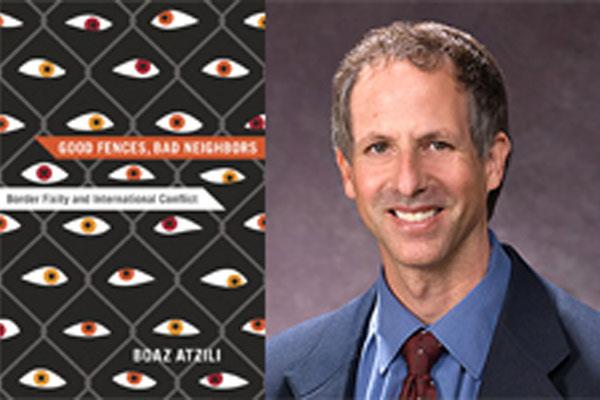Atzili Wins Mershon Center’s Furniss Book Award for ‘Good Fences, Bad Neighbors’

Since World War II, nations have operated under the consensus that territorial aggression and conquest of one state by another should be prohibited. While this has greatly reduced conflict between states, it also may have resulted in an unintended consequence: a proliferation of failed states where government is dysfunctional, social ties are lacking, and civil war is common.
This argument is set forth by Boaz Atzili, associate professor in the School of International Service at American University, in his first book, Good Fences, Bad Neighbors: Border Fixity and International Conflict.
The book, published by University of Chicago Press in 2012, is winner of the Mershon Center’s Edgar S. Furniss Book Award. The winning author receives a cash grant and is invited to speak about the book at Mershon Center.
Atzili will speak on Monday, October 6, 2014, at 3:30 p.m. Registration is at go.osu.edu/atzilib.
The Furniss Award commemorates the founding director of the Mershon Center, Edgar S. Furniss, and is given annually to an author whose first book makes an exceptional contribution to the study of national and international security. Previous winners include John Mearsheimer, Barry Posen, and Stephen Walt.
In Good Fences, Bad Neighbors, Atzili argues that the process of state building has long been influenced by external territorial pressures and competition, with the absence of border fixity contributing to the evolution of strong states — and its presence to the survival of weak ones. What results from this norm, he argues, are conditions that make internal conflict and the spillover of interstate war more likely.
Using a comparison of historical and contemporary case studies, Atzili sheds light on the relationship between state weakness and conflict. His argument that under some circumstances an international norm that was established to preserve the peace may actually create conditions that are ripe for war is sure to generate debate and shed light on the dynamics of continuing conflict in the 21st century.
Atzili is a political scientist who researches and teaches international politics. His interest is in international security with an emphasis on territorial conflicts and the politics of borders, and the international aspects of state weakness and state failure. His research includes cases from the Middle East, Africa, Latin America and Europe. Atzili is also interested in the politics of the Middle East and, in particular, Lebanon and the Israeli-Palestinian conflict.
Atzili has a doctorate from Massachusetts Institute of Technology and a bachelor’s in International Relations from Hebrew University in Jerusalem.
